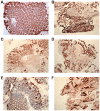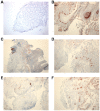Mucosal gene expression of antimicrobial peptides in inflammatory bowel disease before and after first infliximab treatment
- PMID: 19956723
- PMCID: PMC2776509
- DOI: 10.1371/journal.pone.0007984
Mucosal gene expression of antimicrobial peptides in inflammatory bowel disease before and after first infliximab treatment
Abstract
Background: Antimicrobial peptides (AMPs) protect the host intestinal mucosa against microorganisms. Abnormal expression of defensins was shown in inflammatory bowel disease (IBD), but it is not clear whether this is a primary defect. We investigated the impact of anti-inflammatory therapy with infliximab on the mucosal gene expression of AMPs in IBD.
Methodology/principal findings: Mucosal gene expression of 81 AMPs was assessed in 61 IBD patients before and 4-6 weeks after their first infliximab infusion and in 12 control patients, using Affymetrix arrays. Quantitative real-time reverse-transcription PCR and immunohistochemistry were used to confirm microarray data. The dysregulation of many AMPs in colonic IBD in comparison with control colons was widely restored by infliximab therapy, and only DEFB1 expression remained significantly decreased after therapy in the colonic mucosa of IBD responders to infliximab. In ileal Crohn's disease (CD), expression of two neuropeptides with antimicrobial activity, PYY and CHGB, was significantly decreased before therapy compared to control ileums, and ileal PYY expression remained significantly decreased after therapy in CD responders. Expression of the downregulated AMPs before and after treatment (DEFB1 and PYY) correlated with villin 1 expression, a gut epithelial cell marker, indicating that the decrease is a consequence of epithelial damage.
Conclusions/significance: Our study shows that the dysregulation of AMPs in IBD mucosa is the consequence of inflammation, but may be responsible for perpetuation of inflammation due to ineffective clearance of microorganisms.
Conflict of interest statement
Figures




References
-
- Xavier RJ, Podolsky DK. Unravelling the pathogenesis of inflammatory bowel disease. Nature. 2007;448:427–434. - PubMed
-
- Kuhn R, Lohler J, Rennick D, Rajewsky K, Muller W. Interleukin-10-deficient mice develop chronic enterocolitis. Cell. 1993;75:263–274. - PubMed
-
- Elson CO, Sartor RB, Tennyson GS, Riddell RH. Experimental models of inflammatory bowel disease. Gastroenterology. 1995;109:1344–1367. - PubMed
-
- Mombaerts P, Mizoguchi E, Grusby MJ, Glimcher LH, Bhan AK, et al. Spontaneous development of inflammatory bowel disease in T cell receptor mutant mice. Cell. 1993;75:274–282. - PubMed
-
- Sadlack B, Merz H, Schorle H, Schimpl A, Feller AC, et al. Ulcerative colitis-like disease in mice with a disrupted interleukin-2 gene. Cell. 1993;75:253–261. - PubMed
Publication types
MeSH terms
Substances
LinkOut - more resources
Full Text Sources
Other Literature Sources
Molecular Biology Databases
Miscellaneous

